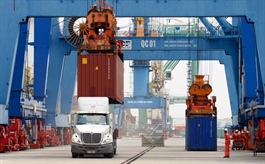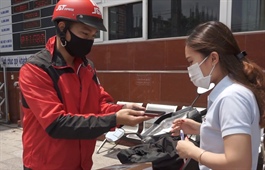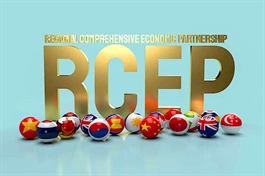New model needed to measure human factor
New model needed to measure human factor
Wealth disparity and inequality in society are growing more serious, but the human economy could provide remove these troubles, while providing free healthcare and education for all citizens.
Nguyen Thi Lan, coming from a poor northern province, now works in a factory in the southern province of Dong Nai. However, with her low wage and high costs of living, she cannot support her three children on her own and has to rely on her parents to take care of them.
Each day, 1,200 pairs of branded shoes go through her hands, but she cannot afford even one pair for her son from her salary. Moreover, working in the factory is a tough job. “I am under great pressure to meet targets,” said Lan.
This is true for many Vietnamese citizens living on minimum wage, which is currently not enough to escape poverty.
According to research from Oxfam, the total assets of the top 1 per cent in the world are double that of the other 6.9 billion people. With a measly 0.5 per cent tax on the total assets of the richest in the next 10 years, 117 million jobs could be created.
“Economies across the world have valued GDP growth more than other aspects of national development. But in 2020, nearly half of humanity had been living below the poverty line, trying to survive on $5.5 a day. Economic growth alone, especially where it is not inclusive, will not beat poverty,” said Max Lawson, head of Inequality Policy at Oxfam International.
“Globally, the way we run our economies needs to change. Our current neoliberal economic model is broken. It is creating huge inequality. Just 26 people have the same wealth as the bottom half of humanity. It is failing to end poverty and trapping many millions in poorly paid and precarious work. The pandemic further revealed fatal weaknesses in the current economic model,” Lawson said. “Therefore, Oxfam is proposing a new economic model, known as the human economy.”
Oxfam’s human economy would measure what matters, the many things left out of GDP calculations such as the distribution of wealth; the broader measures of wellbeing, multi-dimensional poverty, and environmental sustainability; factoring in the harm done to the environment; and recognising and redistributing unpaid care work performed by mainly women each day. “Measuring what matters is vital to planning more progressive and equal economies,” Lawson said.
Khuat Thu Hong, founder and director of the Institute for Social Development Studies, said, “COVID-19 has promoted us to rethink inequality, while we are following high GDP growth targets and technical achievements. We need to change our mindset urgently to develop and share positive values to overcome the pandemic.”
Pham Quang Tu, deputy national director of Oxfam in Vietnam, said that GDP should not be the measure of the country’s development. “Countries need to measure development by broader concepts of wellbeing, multi-dimensional poverty, and factors that compromise environmental sustainability.”
Oxfam appreciates the inclusive development orientation set forth by the Vietnamese government to ensure that everyone benefits from the growth. But in fact, there is still a gap between policy orientation and implementation. “Therefore, we expect the government, ministries, agencies, and localities to build policies and programmes to reach the goals. It will also help change people’s perception of life, putting them and the Earth before short-term profits,” added Tu.
Nguyen Thang from the Vietnam Academy of Social Sciences said that to develop a human economy in Vietnam, it is necessary to follow inclusive development along with mitigating the gaps of assets. “By 2030 or 2045, the increase of inequality in property can contain risks that threaten social cohesion and the development of the country,” said Thang.
“Too much wealth in too few hands is not good for any society, and a human economy would seek to end extreme wealth and reduce inequality,” added Lawson of Oxfam. “A key way to do this will be through progressive taxation, where the richest pay their fair share of tax. For example, taxation on inheritance, which Vietnam does not have, is key to building fairer societies. Otherwise, today’s rich will become tomorrow’s aristocracy. This is unhealthy for the economy.”
In Lawson’s view, tax revenues can be used to provide universal free education and healthcare for everyone. The costs of healthcare and private education weigh heavily on the pockets of Vietnamese people. Free universal healthcare would greatly lessen people’s concerns about getting sick. Investing in good quality public education means that people will not have to spend their money on private schooling and that the children of the poorest will have as many chances as the children of the richest.
























